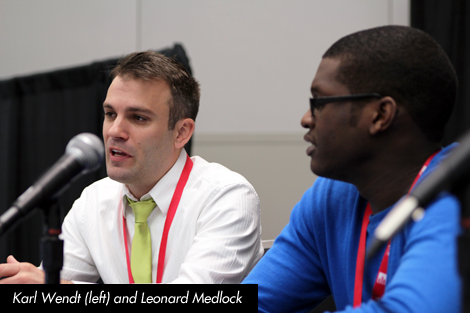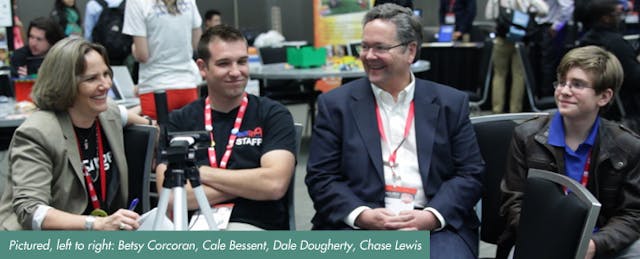The problem was obvious: a round of bottled soda and not an opener in sight. The solution, less so. TechShop’s Carl Johnson hopped onto Thingiverse, an online library of open source 3D models, and ran a search for “bottle opener.” A few minutes later his 3D printer hummed to life...
Seeing Makers like Johnson adapt and hone their DIY skills on the spot was not uncommon at the Makerspace at SXSWedu in Austin, TX, last week. (Yep, we confess: EdSurge had a big role in orchestrating the Makerspace. But enough about us!) Allen McAfee from Fab Lab San Diego sustained the injury of a crucial part breaking on his self-designed 3D printer. Without skipping a beat, he modified the printer plans and asked another Maker to create a copy of the piece--yup, a 3D printer printing a 3D printer. It’s this type of mindbending fractal logic that is pushing Making beyond a curiosity and into a real skill with practical applications.
It was easy to get caught up in the "wow!" factor of hands-on learning while watching lasers strobe patterns into wood and air cannons blast water bottles into the air. However, intrigued educators still wanted to know the bottom line: How do such activities relate to the Common Core Standards? In a panel that included Katie Rast (Fab Lab San Diego) and Karl Wendt (Khan Academy), Dale Dougherty of Maker Media advocated for Making to join the rest of disruptive edtech in changing some fundamentals of education:
“If you break down some of these standards, you realize some things. Who's making these decisions about what the value is? Is the market making that decision, based on careers? How do we really know that? At the same time, we have employers saying schools are producing kids that don't have real skills that fit into the workplace.”
Dougherty elaborated that assessments of efforts like time on task, time invested in a project outside of class, and attendance could provide a more telling story about student learning than do test scores. All three panelists agreed that, realistically, dealing with state standards would involve creating a portfolio of work through which a student could demonstrate concepts learned and applied. (You can find the rest of the panel here.)
Also on the minds of educators was cost. Because 3D printers and laser cutters can run thousands of dollars, seasoned Makers generally agree that newcomers should focus on the essentials first. This might be as simple as buying a used set of hand tools for a class to take apart broken electronics and later scaling up the space by adding more expensive equipment. The organization, Makerspace, has a handy playbook to keep spending in check.

Khan Academy is also getting into hands-on learning with Khan Academy Projects. The program currently includes 70 how-to videos and teaches students how to make robots, projectile launches, and reverse engineer electronics. We talked one-on-one with Wendt about the program, which is currently being piloted at Santa Rita Elementary in Los Altos.
Somehow a young person infiltrated SXSWedu. Chase Lewis, 13, could be seen zipping from booth to booth, asking questions and getting his own projects laser cut and 3D printed. Recently, he was one of the winners of the Smithsonian/ePals "Invent It Challenge" for creating a low-cost transportation device that can be airdropped to refugees. We had a chance to talk in depth to Chase, Dale Dougherty, and Cale Bessent of TechShop and so learn about design thinking and how mastering the art of failure is essential to Making.
The bottle opener lay in two pieces on TechShop’s table by the time I saw it. "Yeah, it broke after one bottle. I should have read all the build instructions," Johnson laughed. For him and the rest of the Makers, picking oneself up is just part of the process.



